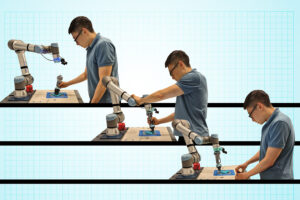July 2025 brought fresh funding rounds, new milestones in robotics, and exciting new deployments. In addition, The Robot Report launched a new program geared toward highlighting interesting startups.
Here are the 10 most popular articles on The Robot Report in the past month. Subscribe to The Robot Report Newsletter and listen to The Robot Report Podcast to stay up to date on the latest robotics developments.
10. MIT’s 3-in-1 training tool eases robot learning
Teaching a robot new skills used to require coding expertise. But a new generation of robots could potentially learn from just about anyone. Engineers are designing robotic helpers that can “learn from demonstration.”
This more natural training strategy enables a person to lead a robot through a task, typically in one of three ways: via remote control, such as operating a joystick to remotely maneuver a robot; by physically moving the robot through the motions; or by performing the task themselves while the robot watches and mimics. Read more.
9. NEURA Robotics partners with HD Hyundai on shipbuilding robots
NEURA Robotics entered into a strategic partnership with HD Hyundai Samho Co. and HD Hyundai Robotics Co. The companies plan to jointly develop and test specialized quadruped and humanoid robots for the shipbuilding industry.
“This strategic partnership once again demonstrates the versatility of cognitive robots – even in one of the most demanding industrial environments in the world,” stated David Reger, founder and CEO of NEURA Robotics. Read more.
8. After Intel exit, RealSense maps its own future in 3D vision
RealSense, known for its 3D depth cameras for robotics, is officially operating as an independent company. RealSense spun out from Intel Corp. with $50 million in funding from Intel Capital and MediaTek Innovation Fund. The Robot Report first reported in January that this spinoff was coming. Read more.
7. Augmentus raises Series A+ funding to reduce robot programming complexity
Despite growing interest in robotics, many manufacturers are held back by programming that is complex, time-consuming, and rigid, according to Augmentus. The company, which is developing an “intelligent no-code robotics solution,” raised $11 million in a Series A+ funding round. Read more.
6. Unitree becomes a legged robot unicorn with Series C funding
Advances in robotic locomotion have led to increased interest in quadrupeds and humanoids. YuShu Technology Co., which does business as Unitree Robotics, reportedly raised an unspecified amount of Series C funding, bringing its valuation to about 12 billion yuan, or $1.7 billion U.S.
The Hangzhou, China-based company has grown from one person in 2016 to more than 1,000 employees, noted Wang Xingxing, founder and CEO of Unitree Robotics, at the 2025 Summer Davos Forum in Tianjin, China. Read more.
5. Galbot picks up $153M to commercialize G1 semi-humanoid
Galaxy General Robot Co., also known as Galbot, completed a funding round of RMB 1.1 billion, or around $153 million. The company said this brings its total funding to about $335 million raised in the past two years.
In March, Galbot released its flagship robot, the G1. The semi-humanoid mobile manipulator features wheels and two arms. It is designed to automate inventory, replenishment, delivery, and packaging. The company said its artificial intelligence models enable G1 to handle 5,000 different types of goods. Read more.
4. Amazon launches new AI foundation model, deploys 1 millionth robot
Amazon.com Inc. announced that it has deployed its 1 millionth robot. The e-commerce company claimed that it has “the world’s largest fleet of industrial mobile robots.”
“I’m excited to share two significant milestones in Amazon’s robotics and AI journey, said Scott Dressner, vice president of Amazon Robotics. “We’ve just deployed our 1 millionth robot, building on our position as the world’s largest manufacturer and operator of mobile robotics.” Read more.
3. The search is on: Help us find the most promising robotics startups
The Robot Report is launching a new program: the Robotics Startup Radar. It will highlight unique and noteworthy robotics startups that we believe our readers should keep an eye on in the years to come.
The robotics industry moves rapidly. Every year, dozens of startups emerge, all claiming they’re developing groundbreaking, industry-changing technology. With our latest offering, we’ll introduce our readers to interesting startups that may dominate headlines in the coming years. Read more.
2. America can’t out-innovate China without mechanical engineers — or robots
The U.S. is falling behind in its efforts to reshore manufacturing, and one of the biggest obstacles is hiding in plain sight: a shortage of mechanical engineers. While China graduates more than 350,000 mechanical engineers each year, the U.S. produces fewer than 45,000. That’s not just a gap in numbers—it’s a structural disadvantage that could limit our ability to scale industrial innovation.
And that doesn’t even include other essential fields of engineering like industrial, controls, and manufacturing, which are just as critical to the future of U.S. manufacturing. Read more.
1. Johns Hopkins teaches robot to perform a gallbladder removal on a realistic patient
Johns Hopkins University announced that a robot trained on videos of surgeries performed a lengthy phase of a gallbladder removal without human help. The robot operated for the first time on a lifelike patient. During the operation, it responded to and learned from voice commands from the team, like a novice surgeon working with a mentor. Read more.
The post Top 10 robotics developments of July 2025 appeared first on The Robot Report.










